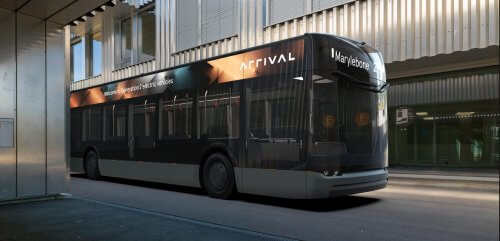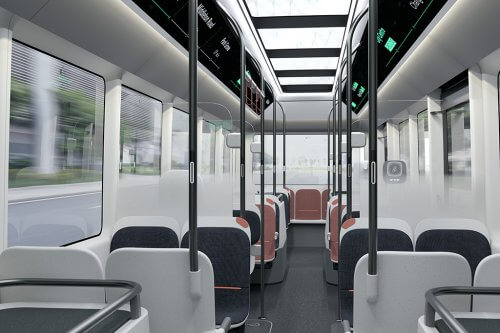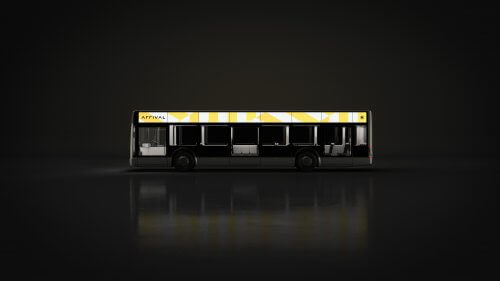A new entrant to the UK bus market was announced on 17 June, UK-based Arrival has revealed a zero-emission bus that it hopes will transform the public transport industry at a time when it is facing its biggest challenges.
The ‘unicorn’ company (a term which refers to start-ups valued at £770m or more) sees the Arrival Bus as the tool cities need as they adapt to a new normal whilst striving to make bus travel appealing, sustainable and financially viable. 
Arrival said it has designed the bus with an exceptional passenger experience front of mind, and it is equipped with features that promote a positive perception of public transportation and create an environment evoking a sense of space, cleanliness and well-being in a world with a heightened awareness of hygiene and personal space.
Although full specifications have not yet been received, Arrival said that the bus will be available in lengths of 10.5 and 12 metres, with the capability to produce up to 15m lengths in 1.5m increments. Maximum capacity is quoted as 125, depending on size, seating configuration and specification, with a range of up to 400km depending on duty cycle.
“Arrival’s core focus is to make your every-day experience radically better, whether that is your daily journey on an Arrival Bus, or through your work as a driver delivering parcels from an Arrival Van. We are working with cities to make every touchpoint within the urban transportation ecosystem not only better but also more equitable and sustainable. Recent events have made it clear the world needs to take action now in order to improve lives and effect real change,” said Kwame Nyanning, Chief of Experience at Arrival.
 “We are very excited to bring the Arrival Bus to markets around the world and make the passenger experience of bus travel a positive one. By working in partnership with businesses to develop the entire ecosystem around our vehicles, we are supporting their goals of making public transport appealing whilst achieving carbon neutrality.” said Ben Jardine, Chief of Product for Arrival Bus.
“We are very excited to bring the Arrival Bus to markets around the world and make the passenger experience of bus travel a positive one. By working in partnership with businesses to develop the entire ecosystem around our vehicles, we are supporting their goals of making public transport appealing whilst achieving carbon neutrality.” said Ben Jardine, Chief of Product for Arrival Bus.
Arrival aims to partner with governments and cities to create an integrated public transport ecosystem that supports their net-zero emission goals. The firm said it is currently in discussions with several operators and cities interested in the bus, but wasn’t in a position to release further details at this stage. The company is also developing cars for sharing, taxis, delivery robots, charging stations, ‘microfactories’ and digital services which it says enable ‘best-in-class’ public transport without the need for subsidies. Arrival says this is possible because their solutions are intelligently designed, with the Arrival Bus priced the same as a fossil fuel equivalent and realising even greater savings over its lifetime.
The Arrival Bus will be produced in local microfactories which are designed to be capable of assembling all vehicles from Arrival’s portfolio. These microfactories support the creation of market-specific products and will regenerate regional economies through the use of local supply chains, retention of talent and payment of local taxes.
Arrival was founded in 2015 and is headquartered in the UK, with over 1000 global employees located in offices across the USA, Germany, Netherlands, Israel, Russia and Luxembourg. UPS announced an order of 10,000 purpose-built electric Arrival Vans in January 2020. The initial 10,000 vehicles will be rolled out in the UK, Europe and North America from 2020 to 2024. UPS has the option to purchase a further order of 10,000 vehicles during this period. UPS venture capital arm also announced an investment in Arrival of an undisclosed amount. Additionally, South Korean car companies Hyundai and Kia have invested £86m in the London-based company which plans to deploy 1000 microfactories globally by 2026. Further details on the company are available on its website at arrival.com.
Here is a link to a video of the new zero-emission bus: https://www.facebook.com/ArrivalGB/videos/683626468868789/

